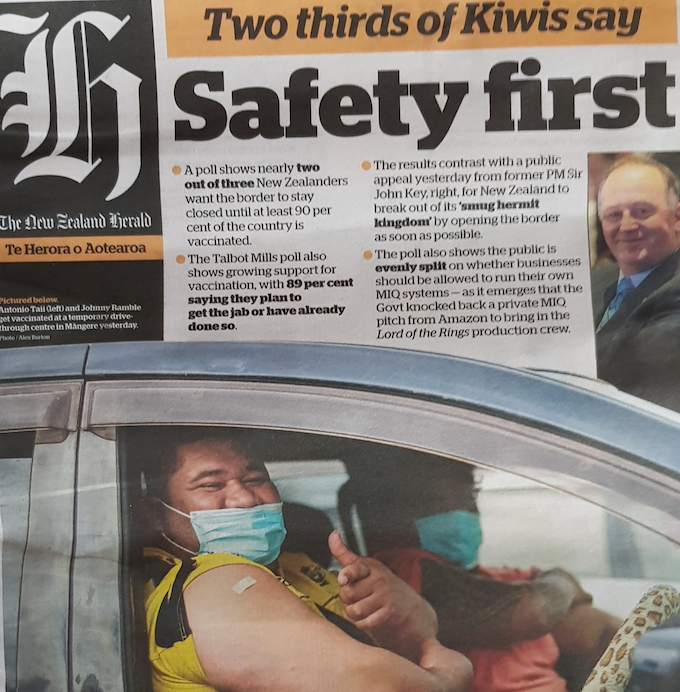COMMENTARY: By Gavin Ellis of Knightly Views
It appears we are a nation of selfish malcontents for whom enough is never enough.
That is one of the conclusions I’ve been forced to draw after seven weeks of covid lockdown in Auckland. And, because my isolation has been broken only by a few medical appointments that are valid reasons for leaving my security-guarded community, I gain my impressions through our media and a diet containing a surfeit of opinion, some of it in the guise of news.
I am confronted daily by examples of peevish bleating, whining, and complaining. I hear demands for certainty where there can be none.
- READ MORE: Two thirds of New Zealanders favour border ‘safety first’, says Herald poll
- In spite of relentless media negativity, NZ’s covid story is largely successful
- Other NZ covid lockdown reports
- Other Gavin Ellis commentaries
I hear commentators crying out for an end to level 4 then level 3 lockdown. They range from predictable nay-saying radio hosts like Mike Hosking, Heather du Plessis-Allan and Kerre McIvor to the unscientific Sir John Key, whose syndicated comments were the product of some yet-to-be-revealed stratagem by the former prime minister.
I see New Zealanders demanding that their right to return to this country be met NOW when it is obvious that the number of intending returnees far exceeds the country’s capacity to safely manage them.
I read of business demanding the ability to trade, and parents demanding to take their children to far-flung spots for the school holidays, when doing so risks undoing the constraint that has been put on the spread of the delta variant.
I am told the government is incompetent or that it has gone too hard, and that the police haven’t gone hard enough on gangs and followers of Brian Tamaki.
Nation of whingers?
What else could I conclude but that we are a nation of whingers?
But I have also concluded that some of our news media are exhibiting signs of split personality: While devoting an extraordinary amount of time and space to the malcontents, they are also pursuing positive campaigns to get the eligible population vaccinated.
They also – thank goodness – show a willingness to accommodate the views of members of the medical and scientific community, whose opinions we so desperately need to hear.
The two positions are not, of course, mutually exclusive. Media have a duty to report dissent as well as the positives. However, while front page lead stories supporting efforts to contain the delta variant have far outweighed those that argue against them, I have a sense that this Winter Of Our Discontent emphasis is compromising the vax campaign by legitimising self-entitlement.
In my lockdown musings I have, however, reached one further conclusion that both saddens and frustrates me. It is the realisation that many of those who need to get the message to get vaccinated are beyond the reach of news media.
These are people who do not read newspapers, watch television news programmes, listen to radio news bulletins or access the online services that each provides. They have no idea what a “1pm stand-up” means.
They do not engage with news on any other basis than word-of-mouth or social media and the results are fragmented, selective, and often-as-not wrong. In other words, the commendable media campaigns to raise vaccination levels never reach them.
Getting to the marginalised
Ways need to be found to get to this marginalised part of our community. Perhaps the answer is for the media to go on the road. A media roadshow visiting suburbs with which they seldom positively identify might have benefits beyond helping us to get closer to that magic 90 per cent vaccination target.
I was about to say I had reached another conclusion but that’s too strong a word for it. I have a suspicion that the Winter Of Our Discontent is not a reflection of widespread public opinion. I am led to that suspicion by two polls.
The first was a Spinoff poll in August that showed 72 percent supported the move to Level 4, and the second was a Talbot Mills survey that showed strong support for keeping our border closed until 90 percent of the eligible population is vaccinated.
These suggest to me a greater level of resilience (and common sense) than negative media stories might indicate. It’s also manifested in the (admittedly limited) interactions I have with people these days.
That also might be reflected in a letter I read in The New Zealand Herald last week. It was in response to a story about a man who feared he would not be allowed to witness his wife giving birth to triplets in Auckland if he returned to Rotorua to work.
M.A. Hume of Mt Roskill, who admitted to being “old enough to remember the Second World War”, recalled a friend whose husband died at El Alamein without ever seeing his daughter and others who had not seen their families for four years and had no certainty of returning to them. “In those days,” the letter writer said, “huge sacrifices were commonplace.”
I would like to think that, today, most of us can muster that same sense of self-sacrifice and resolve. Given the announcements last weekend of rising cases in Auckland and a spread to the Waikato, we’ll need it.
Dr Gavin Ellis holds a PhD in political studies. He is a media consultant and researcher. A former editor-in-chief of The New Zealand Herald, he has a background in journalism and communications – covering both editorial and management roles – that spans more than half a century. Dr Ellis publishes a blog called Knightly Views where this commentary was first published and it is republished by Asia Pacific Report with permission.
- Read the full Gavin Ellis article here:
https://knightlyviews.com/2021/10/05/media-lessons-from-a-pandemic/













































